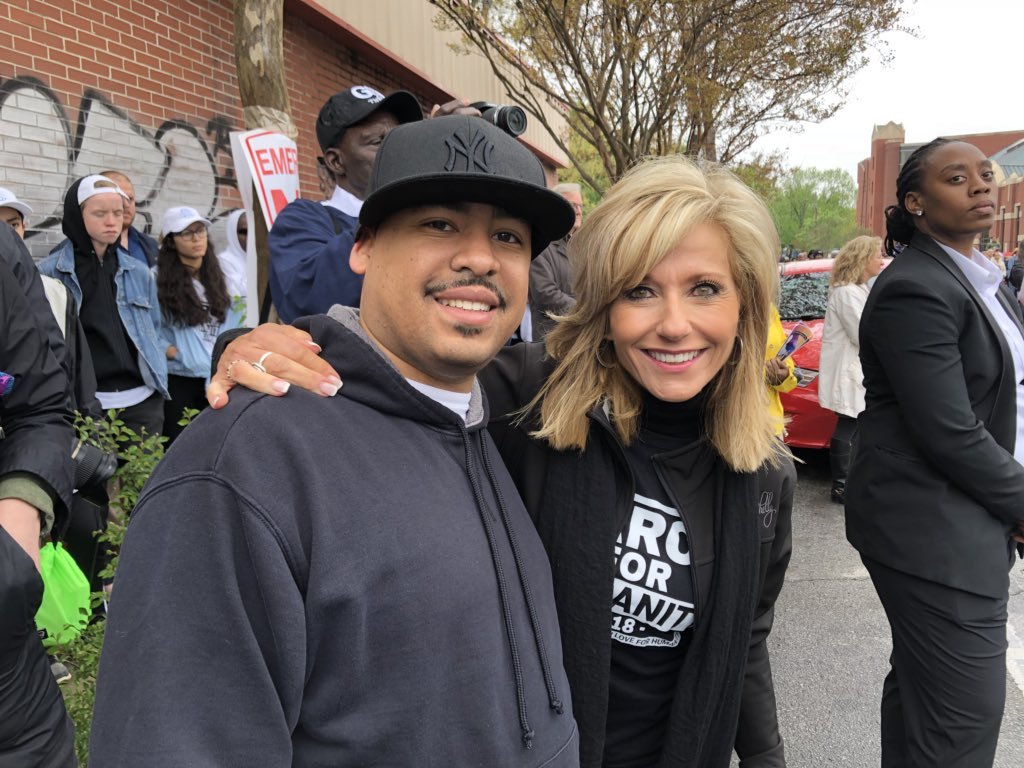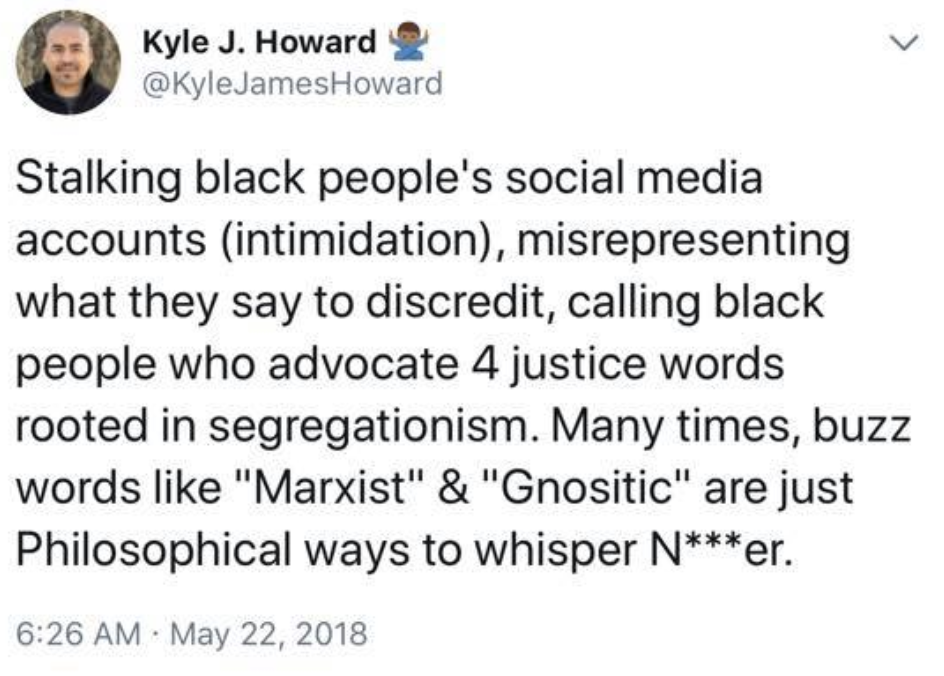
Kyle J. Howard is a student at Southern Baptist Theological Seminary (SBTS) who identifies only as black, although he is of equally white ancestry. Fashioning himself as a champion of the downtrodden, oppressed, disenfranchised, and underprivileged, Howard was raised by two attorneys in an upper-class home in an affluent area of Atlanta. Howard has spent the bulk of his adult life as a community organizer and as a “racial trauma counselor.” Howard also claims to have secretly been associated the notorious Crips gang in high school, although his parents and girlfriend did not know it, there are no corroborating witnesses and no visible markings that indicate his association with the criminal organization. His seemingly contrived personal testimony has bolstered his reputation among religious Social Justice Warriors, as Howard has become an Agent of Influence (also known as a Change Agent) in the Southern Baptist Convention’s flagship seminary. Most recently, Howard has claimed that using the term “Marxism” is just another way to use the “n-word.”
Planted at SBTS for the purpose of ideological subversion, Howard has found himself rubbing shoulders with Russell Moore, Beth Moore, and other leaders who are – intentionally or unintentionally – promoting the textbook tenets of Cultural Marxism and Critical Race Theory. Those who do not want to replace the authentic Gospel with the Social Gospel are rightly pointing out that by the standards and definitions provided by Critical Race Theorists themselves. However, Howard is claiming that to know and cite the writings of those who created Critical Race Theory (who are themselves in significantly higher minority status than Howard himself) is itself, racist.
The book, Critical Race Theory by Richard Delgado and Jean Stefancic (with a foreword by Angela Harris) is perhaps the quintessential book to understanding Critical Race Theory by the theorists themselves. Written by Cultural Marxists for Cultural Marxists, the book aptly explains the blueprint and strategy for changing western ideology in regard to race, gender, sexual orientation and Intersectionality between various identity groups. The basic tenets of Critical Race Theory, according to the social scientists who developed it, are based upon several suppositions:
- Racism is ordinary and is the everyday experience of people of color.
- White people rule the culture and its institutions
- Color-blind conceptions of equality that demand equal treatment across the board (as opposed to favoritism shown to people of color) can only remedy the most egregious forms of discrimination, and the more subtle forms of discrimination must be achieved through punitive actions toward whites.
- Race-consciousness as opposed to the color-blindness promoted by Martin Luther King and other Civil Rights Leaders of the 20th Century.
- Race, like gender and other forms of identity, are not objective, inherent, or fixed, and correspond to no known biological factor; they are products only of social thought. These identities are foreign constructs designed to oppress people.
- The voice-of-color thesis, combined with the notion of antiessentialism, provides the idea that only people of color can explain their struggle to whites, and only they should speak on matters of solution regarding the racial struggle.
- The importance of storytelling; instead of making truth-claims, instead tell stories about your own oppression or the oppression of others; make it about personal experience.
- The existence of white privilege outside the scope of the individual; the notion that white people are privileged, regardless of any other factor, simply because they are white.
- The concept of “microaggression” (the term itself is born out of Critical Race Theory) or “implied racism” or “subtle/subliminal racism.”
- The importance of Intersectionality, or the combining with other oppressed minorities, to challenge the white power struggle.
- The importance of continual victimology; viewing selves and other identity groups as perpetual victims, as key to gaining societal power.
The language, terminology, and strategy of Critical Race Theory is as clear as black and white, as made available to us by the philosophies founders like Derrick Bell, Alan Freeman, and Richard Delgado. It’s not even debatable that the language used by The Gospel Coalition and the Ethics and Religious Liberty Commission (ERLC) are precisely the language invented and popularized by the founders of Critical Race Theory.
Kyle J. Howard, who is in his mid-thirties and whose income is reportedly subsidized by a foundation linked to James Riady, has frantically tried to silence critics of the recent Social Gospel redux promoted by the Evangelical Intelligentsia. Below are just a few of his tweets…

I think he doth protest too much. Of course, the language Howard uses was literally created by the founders of Critical Race Theory. His worldview is that given him by the Frankfurt School of Cultural Marxism. There is literally zero historic doubt from where comes his ideology. Tell us Marxism isn’t bad, but don’t tell us it’s not Marxism.
But, jumping the shark this morning, Howard now claims that calling someone a Marxist is just another way to whisper the “n-word.”
Of course, “stalking” is not the right term for what you call viewing a public social media account (like Twitter) that is posted to voluntarily and purposefully public. The fact is, words like “Marxist” (when used in reference to race) are not rooted in segregation; they are rooted in the 1980s in the movement that agreed and admitted that it was, indeed, Marxist. In fact, Howard’s tweet this morning is nothing but naked victimology, which is itself, from the Marxist playbook.



















